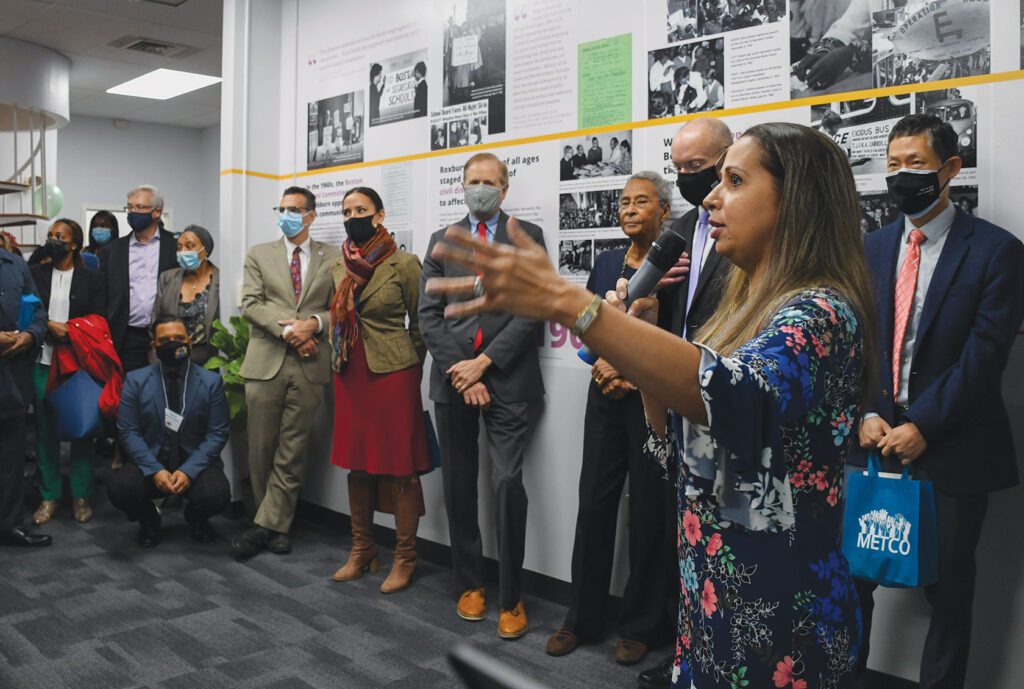
A year ago, when the Wayland School Committee approved La Toya Rivers’ proposal for expanding the district’s METCO program, she saw it as a unique opportunity.
The proposal from Rivers, Wayland’s METCO director, would have brought Boston pre-K students to a new public pre-K, becoming the first suburb to offer seats to METCO students that young.
But when the state government level-funded METCO, the Wayland expansion, which was contingent on increased funding, fell through.
The unsuccessful Wayland expansion, along with approved expansions in five other districts that in total would have added 116 seats, represents on-the-ground impacts of the first time since 2018 METCO didn’t receive a funding increase.
In education — and particularly for a program that faces challenges with high prices for the transportation contracts and gas needed to get Boston students to suburban districts — level-funding leaves a deficit, said Milly Arbaje-Thomas, president and CEO of METCO.
“Legislators need to understand that you just cannot do education and get the same amount every year,” Arbaje-Thomas said. “Special education costs go up; the needs for students have gone up; transportation goes up; contracts go up — both on personnel and on external contracts, such as busing. All of these things are true in any educational system.”
METCO’s leadership was hoping that a supplemental budget currently making its way through the State House would include additional funding that could bolster the program’s funding, but both the House and Senate versions of the bill omitted any increase for the program.
Cliff Chuang, superintendent for Bedford Public Schools, a METCO district, said he generally assumes some increase in any budget from year to year.
“The state budget every year goes up by certain percent, all local budgets every year go up by certain percent,” said Chuang, who previously worked for the state Department of Elementary and Secondary Education as the senior associate commissioner for educational options. “Programs that are funded level, it’s not level-funded, right? Because I don’t know any community that doesn’t provide some cost-of-living increase for their staff, or their contracts don’t inflate.”
On the ground, the level-funding has meant the program is unable to welcome additional students in the six METCO districts that sought expansions.
In Wayland specifically, Rivers said the opportunity was one that, at least in the way she structured it, may not come again. Her proposal for expansion would have included bringing five preschool students through METCO to join a cohort in a public preschool program that is brand new.
“It was like looking at something that was still in its infancy and thinking, ‘Hey, we are building this from the ground up. This is a cohort,’” she said. “Rather than saying, ‘This is what’s already in place, let’s see how they fit.’”
The level-funding also means the anti-racism work the program is attempting as part of its METCO 2.0 initiative is hobbled. The efforts were first launched using a $500,000 line item in the 2023 state budget.
The racial equity work includes assessments of the districts’ current programs, efforts to promote culturally responsive teaching and staff training sessions in restorative justice. But without more money, anything that hasn’t already been paid for cannot move forward.
State Senator Liz Miranda, who serves as the METCO Caucus co-chair, said in a written statement that the program’s expansion and continued equity work should continue to be a priority.
“It’s critical that we prioritize increase funding for METCO to expand enrollment practice and enable the nationally recognized anti-racism curricula of METCO 2.0, and I believe it’s a question of ensuring all my elected colleagues who represent METCO districts understand the profound impact this work has for students and communities,” Miranda wrote.
This year’s budget struggles are another reminder for Arbaje-Thomas that the system, as it’s currently structured, is less than ideal for the program.
“Having to run a program of this magnitude and having no predictability is really nerve wracking,” Arbaje-Thomas said. “You don’t know what you’re telling your districts. You don’t know what you’re telling families.”
She said she has a vision of getting away from annual lobbying efforts yet doesn’t know how to make it a possibility.
Some pieces of the state budget can receive annual funding increases through a formula that ties it to an outside factor. Miranda said she’d like to believe it’s possible that the line item for METCO in the state budget could automatically increase, tied to inflation or the projected cost of education.
Without additional funding in the supplemental budget currently moving through the State House, Arbaje-Thomas said METCO will continue to push for funding in additional supplemental budgets as well as work to ensure legislators know about the organization as they move toward discussions about next year’s budget.
“We just want to be front and center and ready to not be forgotten this time,” Arbaje-Thomas said. “We felt like we were forgotten with this budget.”






